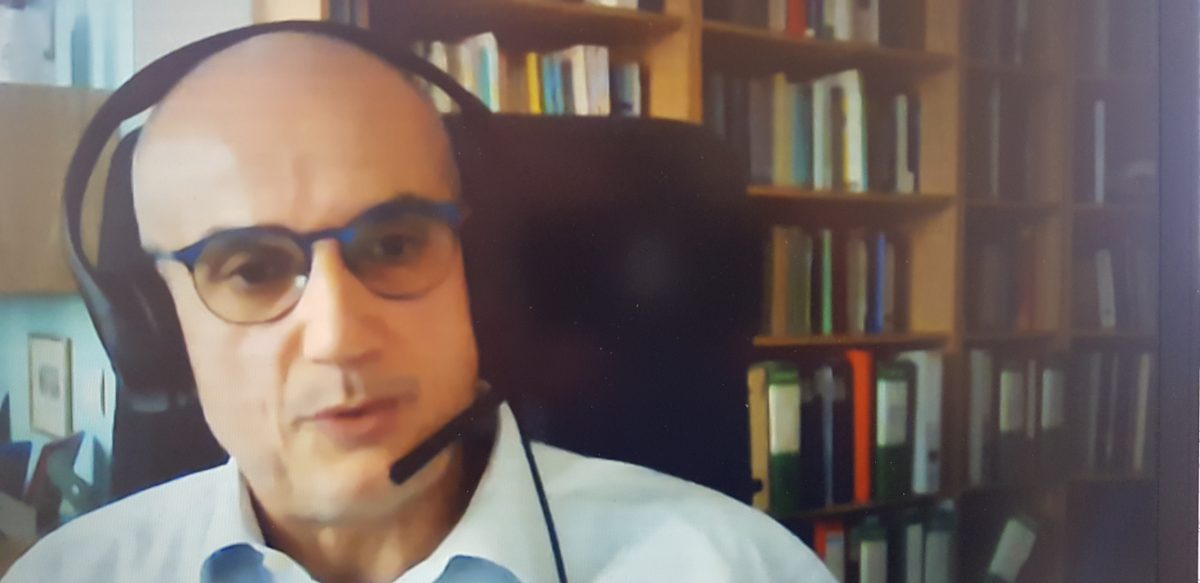Azita Berar is Director Policy of the Global Labor Organization (GLO), and Senior Fellow, Graduate Institute of International and Development Studies, Geneva.
GLO Policy Brief No. 5 – Theme 4. Youth Employment
Appraising the youth uprisings in the Middle East and North Africa.
Ten years on, too early to say ?!
by Azita Berar
It is ten years since several countries in the Middle East and North Africa (MENA), were swept by waves of peaceful youth-led protests, longing for economic and social justice and political freedoms. These uprisings, also called the “Arab Spring”, eventually led to the fall of long established leaders in some countries ( Tunisia, Egypt, Libya), ushered attempts of reform in others (Morocco, Algeria, Jordan), and stalled in protracted and violent civil strife in others (Libya, Syria, Iraq and Yemen) where competing external interventions have compounded internal polarizations.
In this Policy Brief, we argue that the transformational impact of the “Arab Spring” process is more complex, global and open-ended than is generally acknowledged.
____________________
- It has become a common practice, especially on anniversaries such as this one, to revisit the original demands that drove the Arab uprisings at the end of 2010 and throughout 2011 and to measure the progress achieved. But could we or should we assess the outcomes of revolutions, social movements and uprisings by establishing a balance sheet to score successes and failures? To identify winners and losers? Could we attribute responsibilities for these diverging and complex outcomes in different settings?
- Ten years on,- notwithstanding the specific circumstances and dynamics in each country-, the impressions of an unfinished agenda, of an aborted revolution, of stagnation or even backpedaling predominate. These sentiments have replaced the worldwide jubilation, admiration and support that poured then into the symbolic seeds of these youthful uprisings: Sidi Bouzid in Tunisia, the town of M. Bouazizi’s tragic self-immolation and the Tahrir Square in Cairo, Egypt.
- There are many outstanding questions regarding the “Arab Spring”. There is still an unsettled debate for example as how to qualify these uprisings: social movement, political revolt, revolution or any other denomination?
- Regarding the substance of claims that filled the placards carried by young protestors across the region, the twin themes of “Freedom and Equity” predominated, revealing a mix of deeply rooted political, economic and social grievances.
- Chief amongst the socio-economic grievances voiced by young women and men throughout the region, was the demand for “jobs”, more precisely, for “decent work”. The desperate self-immolation of Abu Azizi, a young street vendor in the small town of Sidi Bouzid, which sparked the waves of protests in Tunisia, was symbolic on more than one count. It epitomized the plight of the informal economy, the only source of jobs and livelihoods for a majority of the workforce, in all the dimensions of precarity and insecurity associated with it. The eldest son of a family of disenfranchised small land-owner, he had to abandon his early efforts of farming and after multiple attempts to find decent formal jobs in the town he had come to settle in, he resorted to selling vegetable and fruits on a cart, with funds borrowed, to cater for himself and the family of six. He also had to struggle all along to finish his own schooling and have his siblings go to school. As a street vendor, he was subject to continuous harassment by local authorities on various grounds including for presenting a permit that later was confirmed that he did not need. The situation of informal economy workers is not much different today. Informality is on the rise with the continued youth employment crisis in the region. The COVID-19 induced economic slowdown has increased poverty including working poverty. The various relief and compensation packages, seldom take into account work and income losses and access to health and social protection of those who live and work in conditions of informality.
- The tragic event also gave a human face to the millions of young women and men in the region, who each year, upon finishing school, struggle to find a decent job and a meaningful place in the society. Ten years on, youth unemployment rates remain as stubbornly high, in all of the MENA region, as a decade ago; sadly, the highest in the world[1]. Difficulties in school to work transitions affect all strokes of youth including the university graduates. The “decent work” deficits are also manifest in more significant indicators, such as high incidence of inactivity and discouraged labour and low pay jobs amongst youth. Across all these indicators, youth are affected disproportionately, compared to their relative weight in the population and young women consistently, at a higher disadvantage. The gender gap is significant signaling pervasive segregation and discrimination in numerous sectors. In addition, women shoulder a disproportionate share of unpaid care labour, in view of the limited availability of affordable and accessible social infrastructure for child and elderly care.
- While the demographics in the region, in particular the youth bulge, explain the pressure on labour markets, they do not excuse the poor performance in youth transitions. There is a collective political responsibility of policy actors in public and private spheres in the region for, gradually but surely, missing out on the short and irreversible window of opportunity that the “youth dividend” represents. The same dividend that many analysts consider, as a key success factor in promoting the “East Asian Tigers”’ economic miracle[2].
- Despite all the soul-searching that was undertaken in the wake of youth protests a decade ago, internally, as well as by international institutions and development partners, the main course of economic and social strategies, have not changed fundamentally.
- Scholars of the region had pointed then to the gaps and needed direction of change to deliver on more and better job-friendly and inclusive outcomes. The kinds of structural changes in economic strategies that were advocated, such as supporting an endogenous Research and Innovation (R&I) capacity and a genuine industrial policy redressing the exclusionary nature of current privatization policies, as well as better negotiating terms of integration in the global economy, have not been followed suit.
- The discursive mea culpa of international financial institutions for the neglect of the social and human side of the equation[3] , was not followed through either with action or support for the adoption of alternative macro-economic frameworks.[4]
- Whilst in the first few years after the uprisings, the region saw a flurry of projects and increased development cooperation dedicated to youth employment, gender equality and in support of reform and inclusion agendas, these did not amount to a significant change in policy priorities and approaches. Investments in access to health, in quality education, in inclusive skills’ training opportunities and for extending capacities for implementation and institutional development have not matched the needs. Even in Tunisia which, by all accounts, has had a most peaceful and successful transition to date , thanks to the strength of its social institutions[5], policy reform and implementation have become captive of protracted consultations, political balancing and frequent changes in ministerial assignments.
- On the objective of democratization, the score may seem even weaker, and the space that was created and occupied seem to have closed or significantly shrunk. Aside from the Tunisian exception, elsewhere coercive measures and repression, and sometimes, serious breaches of human rights, seem to have won over. The no-choice policy narrative of “radical Islamism” or “autocracy” prior to the Arab uprisings is gradually replaced by another no-choice, that of either “chaos” or “autocracy”.
- However, it will be wrong to limit the legacy of the Arab Spring to these considerations, as fundamental as they are. The unmet aspirations have not de-legitimized the original drive. The acquired experience of new citizenship rights, of holding the rulers accountable and the claims of “dignity”, “justice” and other non-quantifiable transformational values, awakened by the 2010-2011 protests, are vivid. The more recent rounds of protests in Sudan, Algeria, Lebanon, show that these demands and expectations, resurface recurrently and occupy the space that can be occupied. Each time, the agenda of demands is pushed into new spaces and in more creative ways.
- Finally, shouldn’t we look at “Arab Spring”, its triggers and outcomes, by situating it more globally ? Most people analyze the “Arab Spring” through an “essentialist” lens, explaining its rise and demise from the specific historical and geopolitical conditions in Middle East and North Africa. There is another perspective to consider: that of the chain of protests against inequalities and backlashes of globalization that have sparked indifferent geographies and succeeded each other throughout the last decade.
- We should recall that the youth uprisings in MENA followed shortly the 2008 global economic financial crisis that caused global recession and slowdown, with massive impacts on jobs. The global crisis was revelatory of another, that of an unprecedented youth employment crisis. The “Arab spring” was preceded by the 2009 “Green Uprising” in Iran, and followed by numerous bouts of similar protests on the other shores of the Mediterranean and beyond. Such as those by the “Indignados” starting in Spain, or “Occupy Wall Street” for example, that developed in the following months and years and spread worldwide. The reference by the “Occupy” movement to the “Tahrir moment”[6], clearly shows the catalytic role that the “Arab Spring” played in the string of social protests movements in the early years of the decade.
- While the local dynamics and demands differed, there were several common denominators amongst these youth-led leaderless movements. First, was a loud outcry against inequalities and neo-liberal policies that shaped the globalization, in particular for failing to deliver on the goals of full and decent employment and on social inclusion and mobility agendas. Another common demand was the quest for new forms of participatory democracy and for creating new forms of local empowerment as a means to rebuild trust in the institutions. Unsurprisingly, in the midst of another global crisis, that of COVID-19, these demands have re-emerged creating a new momentum for paradigm shifts.
- The Arab Spring also acted as a catalyst to the emergence of yet another phenomenon, that of “youth agency” in global governance. Several international resolutions and calls for actions spearheaded by the United Nations System were adopted in direct response to the youth employment crisis[7] revealed by the 2008 financial crisis and echoed through the 2010-2011 “Arab Spring”. Ever since, inviting youth as a distinct stakeholder in the policy conversation and promoting youth voice and engagement in consultative and advisory formats, in various forums related to sustainable development or to peace building agendas has become a new standard pattern. The organization and institutionalization of numerous youth fora along global, regional and national policy making conferences, the growth of new youth-led or youth-centered organizations in all regions and their engagement by multiple stakeholders, governments, private sector, civil society and academia, show the road traveled in less than a decade.
Ten years is a short period in a historical perspective.But what is an adequate time frame to appraise the impact of the “Arab Spring” ? There is a famous quote attributed to the Chinese premier Zhou Enlai. When asked in early 1970’s about the influence of the French Revolution, he is reputed to have said: ‘Too early to say!’
The 2010-2020 decade joins two major global crises. The 2008 global financial crisis followed by the austerity policies adopted since 2010, and the COVID-19 pandemic in 2020. These crises triggered massive social and economic meltdowns, waves of social and political protests and alternative ideas looking into the future. In this broader perspective, how to appraise the impact of the “Arab Spring”, in the region and globally ? Certainly in more complex terms and it is “Too early to say”.
__________________
[1] In 2020, the youth unemployment rate in North Africa stood at 30 percent compared to the world average of 13,6 percent. For all indicators, see various editions of ILO, Global Employment Trends for Youth.
[2] There is a growing body of empirical evidence on the subject since the original work by D.E. Bloom & J.G. Williamson, Demographic Transitions and Economic Miracles in Emerging Asia, was published in 1997.
[3] Momani, B and Lanz, D (2014) Shifting IMF Policies Since the Arab Uprisings, Centre for International Governance Innovation, Policy Brief no. 34.
[4] Mohammed Mossallam, The IMF in the Arab world: Lessons unlearnt, SOAS, University of London, December 2015.
[5] The Tunisian National Dialogue Quartet composed of the UGTT (the Tunisian General Labour Union), UTICA (the Tunisian Confederation of Industry, Trade and Handicrafts), Tunisian Human Rights League and the Tunisian Order of Lawyers, was awarded the 2015 Noble Peace Prize for its decisive contribution to consolidate democratic gains and a peaceful constitutional settlement.
[6] The organizers of the Occupy Wall Street posted in their July 2011 web-post: Are you ready for a “Tahrir moment”? The expression has been used multiple times since.
[7] See ILO, 2012 The youth employment crisis: A call for action. adopted by tripartite constituents from ILO’s 189 members. ILO subsequently led the for formulation and launch in 2016 of a Global Initiative on Decent Jobs for Youth, a joint UN system wide initiative and multi-stakeholder partnership.
NOTE: The opinions expressed here are those of the author and not of the GLO, which has no institutional position.
Ends;

















